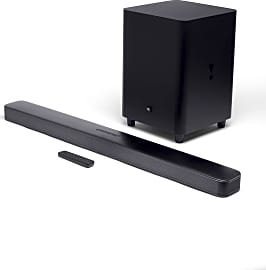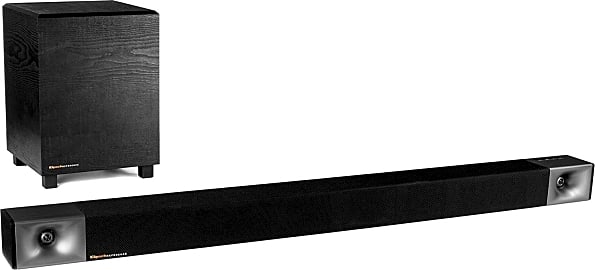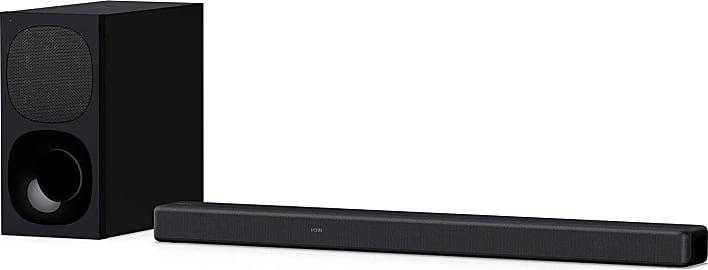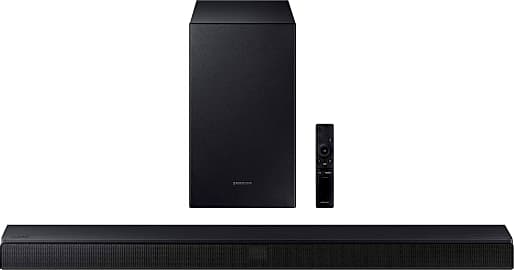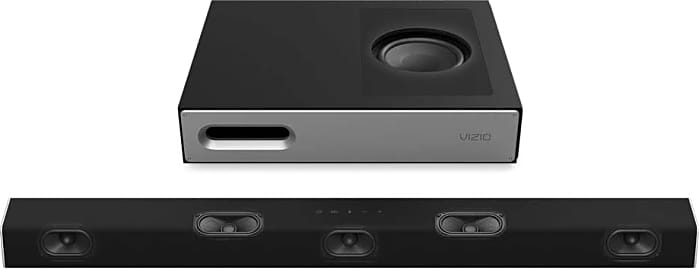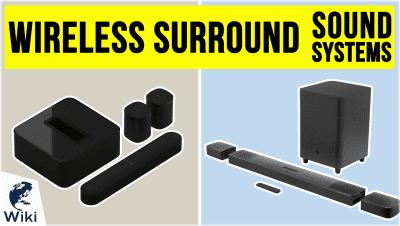The 10 Best Soundbars

This wiki has been updated 42 times since it was first published in March of 2015. Yes, it's really annoying that most flat screen TVs do not come with forward-facing speakers, so they sound dreadful. But you can still fix that audio conundrum with one of these sound bars and give your TV shows, music, movies, and sports that extra clarity and ooomph they deserve. You can choose one that comes with or without a subwoofer, depending on your bass preferences. When users buy our independently chosen editorial selections, we may earn commissions to help fund the Wiki.
Editor's Notes
October 01, 2020:
As with our last visit to this ranking, every company we previously included has come out with a new and improved version of their previous bars. We're seeing more of the top companies include 4K passthrough over HDMI ARC connections like you see on the Sony HT-G700, as well as Bluetooth 5.0 support that often allows for multiple devices to be connected at once, and for you to switch among them seamlessly.
Users interested in creating a surround sound environment should ask themselves if they want a model that can pair with additional satellites, like you see with the LG GX 3.1, or one that uses directional audio to create a virtual surround sound environment like you see with the JBL 5.1 Home Theater. Just be advised that these virtual setups rely somewhat on the configuration of the rooms they live in and the walls off which they might be able to bounce their right, left, and rear channels.
April 03, 2019:
There's been a fair amount of turnover in this category lately, with many of the top brands bringing out new models over the past year. Some offer slight upgrades, like the new Bose system that has Alexa built in and comes with a much less embarrassingly large remote control. Of course, that bar was already an excellent performer, so not much needed to change, and it finds itself firmly at the top of our list. Others have seen more substantial improvements, like the new Sonos bar, the Playbase, which has been completely redesigned to act as a platform for your television in addition to pumping out very high quality sound. Some companies haven't offered anything new, unfortunately, like the Paradigm Shift Soundscape, which appears to be several years removed from any kind of upgrade.
Special Honors
Leon Speakers Horizon HzOTO MCA This offering is designed to be as slim as possible without sacrificing much in the way of power. It can deliver 150 watts per channel with a quartet of woofers and silk tweeters. The whole device is less than three inches thick, and you can get one sized to sit beneath a wall-mounted TV up to 65 inches or up to 96 inches in size. leonspeakers.com
Sonance Soundbar With its innovative design, this model allows you to extend or collapse its housing to match the width of any television between 50 and 80 inches in size class. Each unit has three Kevlar cones and powder-coated tweeters, with a wide frequency response and hardware for wall mounting or setting up on your TV stand. sonance.com
Surround Sound Without Being Surrounded By Cables
By contrast, passive soundbars do not come equipped with built-in amplifiers, so they'll require some additional wiring, separate amplifiers, and a receiver.
Not everyone has an entertainent room the size of a palace for accommodating huge volumes of equipment, plugs, and multiple speakers to emulate the experience of being in a movie theater or nightclub. The limitations of available space, combined with the consideration of an extremely tight budget, can easily create a niche for audio technology that is designed to deliver excellent sound without resorting to complex surround sound setups. This is where a soundbar's unobtrusive design and practicality come into play.
A soundbar is an audio device that consists of several particularly positioned internal speakers within one cabinet assembly. Each speaker within a soundbar is specially fitted to simulate surround sound in the same way as a conventional audio system setup. A soundbar uses a psycho-acoustic effect to allow sound to literally bounce of the walls of your entertainment room. This effect can trick your senses into thinking that there are speakers behind you when there aren't.
These devices can be defined as either active or passive. Active soundbars feature the all-in-one setup, meaning that their speakers and amplifiers are all housed together within a single unit. By contrast, passive soundbars do not come equipped with built-in amplifiers, so they'll require some additional wiring, separate amplifiers, and a receiver. For the most part, we recommend you go with an active model, as many of the top manufacturers are moving away from passive as the fidelity of active units has more or less caught up with that of their passive cousins.
One of the major benefits to owning a soundbar is that the device is usually compact, thin, and very easy to install. Soundbars are typically paired with flat screen televisions and are designed to sit either underneath or in front of the television itself. If your television is wall mountable, many soundbars also come with their own mounting kits so they can also attach themselves to a wall directly below the television for an optimal audio experience.
The soundbar is also useful for anchoring movie dialogue. What does this mean exactly? Because of its acoustic design, the soundbar can disperse movie audio equally throughout a small entertainment room so that any listener, regardless of their location, will experience the same audio quality as though they were centrally-positioned right in front of the television and its stereo speakers.
Soundbars generally work well in small entertainment rooms. While you may think that you're sacrificing audio quality by investing in a soundbar, the fact is that a small apartment doesn't command such an elaborate audio setup to carry sound over long distances. For that reason, a soundbar is also a more cost-effective audio solution for your apartment than a conventional speaker system.
Setting The Bar High
The first thing one must consider when investing in a soundbar is the space in which it is to be installed. The size of your entertainment room will help you decide what type of soundbar configuration works best. For a large space, consider purchasing a soundbar that also includes a subwoofer component so that the audio is carried throughout the entire room.
The size of your entertainment room will help you decide what type of soundbar configuration works best.
If you have a lot of music stored on your mobile device, computer, or laptop and plan to use your soundbar to project music as well as film dialogue, then you definitely want the soundbar to have built-in Bluetooth connectivity for accessing your favorite tunes wirelessly.
Consider how and where you plan to place your soundbar. If your dresser already accommodates a large flat screen television, then you may want to shop for a soundbar that can be used as a pedestal for the television, while also keeping the sound centralized as you watch.
Pay attention to the input and output ports available on the soundbar so that you have ample freedom to connect HDMI cables and USB devices.
Soundbar Technology Over Time
The very first soundbar and subwoofer system was developed by Altec-Lansing in 1998 called the Voice Of The Digital Theatre (also known as the ADA 106). This device used the company's side-firing technology to simulate surround sound from almost any direction. This invention served to eliminate the need for excessive wiring of multiple speakers to achieve the same result.
This device used the company's side-firing technology to simulate surround sound from almost any direction.
In 2002, Pioneer Electronics released the first digital sound projector that used a single-source speaker to deliver 5.1 channel surround sound audio.
The Yamaha YSP-1 digital sound projector won a Best of Show award in January 2005 at the Consumer Electronics Show. This device featured 40 small center drivers that were designed to control sound being reflected from walls of a room.
In June 2015, Denon released their HEOS HomeCinema system that came complete with a wireless subwoofer for producing crystal clear upper bass sound.
Today, soundbar development is also branching into the phased array technology space.




